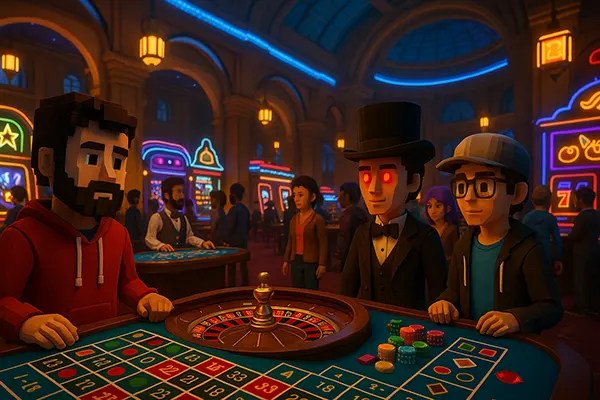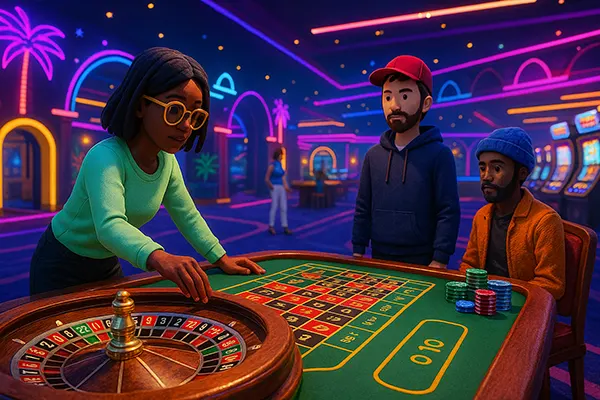
Gambling Impact in the Metaverses: First Casinos in Decentraland and The Sandbox
The gambling industry has always been one step ahead in adopting emerging technologies. In 2025, one of the most notable shifts is taking place within the metaverse, where virtual environments like Decentraland and The Sandbox host fully operational online casinos. These are not just digital representations of traditional gambling spaces—they combine decentralised finance, NFT ownership, and immersive 3D experiences, creating new behavioural patterns among users and regulators alike. This article explores how virtual casinos function in metaverses, compares them to conventional online gambling models, and outlines both the opportunities and risks involved.
How Virtual Casinos Operate in Decentraland and The Sandbox
Casinos in Decentraland and The Sandbox are decentralised gambling environments built on blockchain. Instead of relying on a central operator, these virtual spaces often integrate smart contracts and decentralised apps (dApps) to enable fair gaming. Notable examples include Decentral Games in Decentraland and various community-driven gambling experiences in The Sandbox that use LAND parcels to build and monetise custom venues.
Games in these casinos range from roulette and blackjack to more gamified betting mechanisms that incorporate metaverse-specific elements, such as avatar interactions and item staking. Visitors navigate these spaces with their avatars, engage with NPCs, or challenge other players. Most casinos operate continuously, enabling participation from a global audience across time zones.
Importantly, these casinos are not isolated ecosystems—they are often integrated with Web3 wallets like MetaMask, enabling users to connect seamlessly, verify age, and deposit tokens directly. The transparency of the blockchain adds a layer of credibility to games of chance that would otherwise be difficult to regulate in such open environments.
Regulatory Position and Ownership Structures
Unlike traditional licensed operators, virtual casinos in Decentraland and The Sandbox are usually managed by decentralised autonomous organisations (DAOs) or individual creators. This structure complicates the legal classification of such venues, especially as gambling laws vary significantly across jurisdictions. Some are registered offshore, while others openly bypass local laws, relying on the pseudonymity of blockchain-based access.
Property ownership within these metaverses is tokenised via NFTs. Each casino venue is typically built on LAND parcels that were either purchased or leased using the native currencies—MANA for Decentraland and SAND for The Sandbox. This model enables anyone with technical skills and capital to establish a gambling venue, but it also raises questions about accountability and oversight.
From a consumer protection perspective, the decentralised model challenges traditional enforcement tools. While smart contracts may ensure technical fairness, ensuring responsible gambling behaviour remains largely in the hands of the player or the casino’s internal moderation systems, which may be minimal or absent.
Gameplay in Traditional Online Casinos vs. Metaverse Gambling
The fundamental mechanics of games such as roulette or slots remain the same across both traditional websites and virtual metaverses. However, the user experience in metaverse gambling adds a social, immersive, and gamified layer. Instead of simply clicking to spin, players walk through virtual rooms, sit at tables, and interact via voice or chat with other avatars.
This creates a more engaging atmosphere, blurring the line between gaming and gambling. Traditional online casinos still offer faster gameplay and more sophisticated odds engines, but they lack the communal and exploratory feel that metaverses provide. Additionally, users in metaverses often unlock custom skins, badges, or token incentives tied to their engagement level.
While traditional platforms are optimised for accessibility and efficiency, metaverse casinos appeal to a new demographic—tech-savvy users looking for novelty and a sense of ownership. These users may also value the ability to host events, invite friends, or stake NFTs as part of their gambling experience.
User Engagement and Immersion
In Decentraland and The Sandbox, the 3D environment serves not just as decoration, but as a dynamic playground. Players enter through visually designed portals, approach dealers, interact with other users, and sometimes even complete quests that tie into gambling mechanics. The engagement is not transactional; it’s experiential.
This format increases the session time per user and encourages social gambling—a model that mirrors real-world casino floors more closely than static websites. Players can attend events, concerts, or NFT exhibitions hosted within the same LAND area, increasing retention and brand loyalty.
However, with increased immersion comes the risk of addiction. Unlike websites where players can simply close a tab, leaving a metaverse casino may require more deliberate action, which could blur the boundary between casual and compulsive use.

The Role of Cryptocurrencies and NFTs in Betting
In metaverse casinos, cryptocurrencies are not only the medium of exchange but also the enabler of the decentralised structure. MANA, SAND, ETH, and other tokens are used to place bets, receive winnings, and unlock exclusive features. Most transactions are processed instantly via smart contracts, which ensures transparency and fairness—at least from a technical standpoint.
NFTs add an additional layer of gamification. They can be used as entry tickets, loyalty badges, or even betting items. Some casinos introduce NFT staking mechanisms, where players can lock up rare digital items for access to premium tables or higher multipliers. These items also carry secondary market value and can be resold on open marketplaces like OpenSea.
This integration has a dual effect: it increases the entertainment value and personal investment of the user, but also exposes them to higher levels of volatility. As the value of crypto assets fluctuates, so do potential winnings and losses. For less informed users, this creates financial risks that are not present in fiat-based gambling environments.
Security and Transparency Challenges
Blockchain-based gambling relies on transparency as a security measure. Game algorithms and smart contract logic are often publicly accessible, allowing users to verify fairness independently. However, the decentralised nature also makes it harder to recover funds in the event of scams or technical errors.
Unlike licensed casinos that must adhere to AML and KYC protocols, many metaverse casinos offer full anonymity. This opens the door for both money laundering and underage gambling, despite technological barriers meant to prevent it. The lack of oversight from central regulatory bodies further complicates consumer protection efforts.
Users must also manage their digital wallets securely. Phishing attacks, compromised keys, or malicious contracts could result in complete loss of funds, as there is no “reset” button or customer support hotline equivalent to what exists in traditional gambling services.
